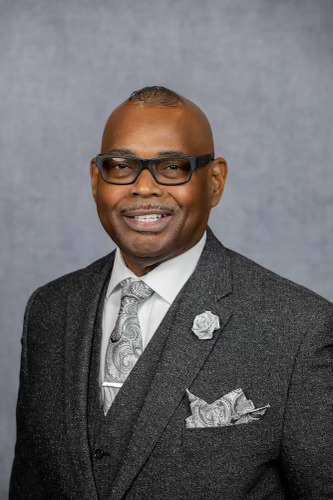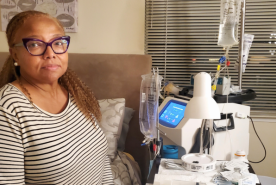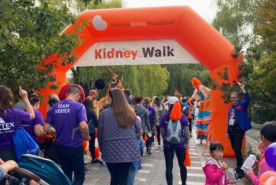March 01, 2024
Shining A Bright Light of Advocacy
Jennifer Cramer-Miller
Two decades ago, when Charles Rice was in his thirties, he felt invincible. A married hard-working man, he never imagined his life would change dramatically. The magnitude of kidney failure was beyond his imagination.
Until it wasn’t.
Symptoms of kidney disease are often silent—until they shout. During the 1990s, high blood pressure, edema, and obesity quietly took their toll on Charles’ kidneys.
Then, in 2003, Charles ended up in an emergency room carrying eighty pounds of extra fluid on his large frame. His remaining kidney function was a meager 5%. A press of a thumb dented into the swelling in his legs, he couldn’t tie his shoes without his wife’s help, and he had a reduced urine output—but he still didn’t grasp how sick he had become.
Next thing he knew, he required dialysis to survive.
The hospital became his home for the following month and a half. As doctors and nurses removed the extra fluid, Charles endured a crisis of emotions, finances, and health. His work suffered and he felt forced to sell his truck to keep his house.
His job involved machine maintenance. That’s why, during his dialysis treatments, he studied the life-saving artificial kidney machine with the curiosity of someone who liked to know how things worked. His inquisitive nature and love of learning pushed him forward during this medical setback.
Charles’ faith, plus a powerful drive to keep going, propelled him through the long days. He felt both a responsibility and pressure to provide for his family.
“I had to be the glue to hold us together. I’m not a quitter,” he says with firm conviction. “If you let your kidney disease take over, you can’t overcome the disease.”
So, while he managed his life on dialysis, he set out to learn everything he could about kidney disease, medications, and organ transplants. That determination yielded two degrees: an associate pharmacy degree and a bachelor’s in business.
In December 2007, over four years on dialysis, Charles received that long-awaited call from Abbott Hospital that a kidney was available for him. Now, sixteen years later, that kidney is still enabling Charles to impact the lives of others. He shares his good health, considerable education, and passion to help numerous kidney patients.
Grateful for the gift of life, he explains, “I want to pay it forward.” So today, you’ll find Charles empathizing with and educating fellow kidney patients. “It can be frightening for patients,” he says. “So, I explain the medications and help patients understand their treatment options.”
He also encourages patients to adhere to healthy eating habits and be proactive with their kidney health. Clearly, Charles lives what he preaches. Years ago, he lost a significant amount of weight to maintain his kidney health, and he monitors his diet carefully.
“Patients need to be their own best advocate,” he stresses.
Today, feeling strong with his transplanted kidney, Charles remains a busy man. His patient advocacy serves the National Kidney Foundation, the American Kidney Fund, the American Association of Kidney Patients, and the Midwest Kidney Network (to name a few.) In and outside of Minnesota, he spreads his advocacy efforts.
Charles is passionate about health equity in kidney care. While he acknowledges that many Black patients are rightfully distrustful of trials, he encourages people of color to become involved to ensure more equitable clinical representation.
He also beams with pride about the recent team effort that eliminated the race-based calculation of kidney function (eGFR) in 2021. As he should. Their monumental efforts have paid off. The race-based calculation of kidney function was eliminated thanks to a task force led by the National Kidney Foundation and The American Society of Nephrology.
Charles is also lobbying to include kidney health education in high school curriculums. And as the upcoming Minnesota Lobby Day takes place at the St. Paul Capital on March 6th, Charles will be there. Front and center, sharing his knowledge and passion to make life better for kidney patients.
If there was ever a quintessential definition of a kidney patient advocate, it might be “Charles Rice.” His motivational energy to give back shines.
As his strength lifts him, his motivational muscle also lobbies legislation to lift many other kidney patients. “Sometimes you have to pull yourself up and look around the next corner. You’ll see a brighter light...” Charles says.
And one thing remains clear, whatever direction Charles Rice leads, a glimmering path lies ahead.


















